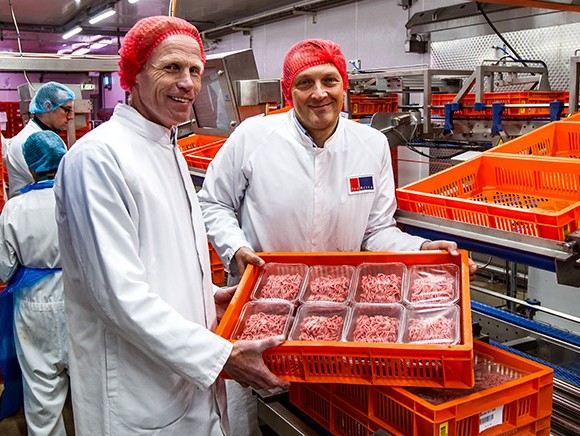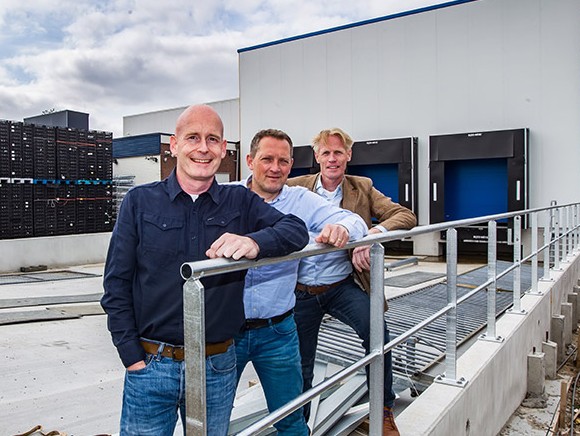
Central butchery ProMessa in Deventer outgrew its home. They are adding a new production hall, where sustainability - as in the rest of the business operations - plays a prominent role.
The growth of the company was not the only reason for the new construction, director Harold Rouweler explains: “We needed more space for the production lines. These serve to, for instance, meet the changing legislation and customer wishes”. Among other things, the production of ground products and part of the labelling and logistics will take place in the new space. The hall, which covers approximately 3,200 square metres, will be officially opened in October.
ProMessa was founded in 1964 and has been a subsidiary of Coop since 2008, but also provides meat to various other supermarket chains under a private label. At ProMessa, the meat is portioned, sometimes seasoned or marinated, and then packaged with vary modern technologies. “We send out over 600,000 packages every week”, says Operations Manager Hendrik Bom. “The exact number can differ per week, depending on supermarket promotions and the weather. Around the holidays or with barbecue weather, we have enormous sales peaks. And because we are an ultra-fresh chain, we have to be able to respond very quickly.” Therefore, close cooperation with the retailers is very important, according to Bom. “We work together in chain design and product development. This way, we can supply consumers with good and healthy meat.”
“Collaboration is the key to innovation”, says Rouweler. Therefore, ProMessa is fully committed to sustainability together with customers and suppliers. They mainly work with Dutch meat; often with one, two or three Better Life stars. The company uses separated waste flows, ecological cleaning agents and green energy. A novelty and unique in the meat industry are the dishes in which the organic range is packaged. These are made of vegetable raw materials and are fully compostable. ProMessa also distinguishes itself with the WMS system, which is used to sort and deliver at the store level. Operations Manager Bom: “The meat makes it to the store quickly, resulting in a longer shelf life. This leads to less loss and higher sales. A huge advantage in the industry”.
‘Collaboration is the key to innovation’
When the first plans for the new construction came to the table, it soon became clear that the sustainable policy needed to be reflected here as well. And so it happened: for instance, there will be solar panels on the roof, the cooling installation fully works with the natural refrigerant CO₂, there are water savings and heat recovery, and motion sensors are used where possible. “We wanted to build in accordance with the BREEAM guidelines, which fit with our CSR ambitions”, says director Rouweler. BREEAM is the international instrument to measure and assess the sustainability of buildings. Rouweler: “With this new construction, we strive for the BREEAM ‘Excellent’ level. We have already obtained the design certificate for this.”
An indispensable partner for ProMEssa in the design and guidance of the new construction is the RBK Group: an engineering and automation company that specialises in designing and realising (new) construction projects and providing automation solutions in the food industry. Like ProMessa, RBK is located in Deventer, but that was not the reason for the collaboration. Rouweler: “Of course, that has advantages. But ultimately, we care about quality and trust. We have heard many good stories about RBK, and they have extensive experience with the food industry and building in accordance with BREEAM. Plus, we clicked.”

RKB came into the picture at an early stage. Architect Hans van den Hoorn explains: “We start with a thorough inventory of the wishes and possibilities of our client, and analyse how the company and its production are organised. Based on that, we create an integral design for the building and the building installations: electrical engineering, mechanical engineering and cooling technology. We apply for the permits, draw up specifications and guide the tender”. Bom adds: “This was handled very correctly; RKB really proved itself to be an independent party”. Van den Hoorn continues: “We also take care of the building guidance during the execution. This way, we are involved in the project from the first idea all the way to the commissioning”. The fact that the new construction at ProMessa was a home game makes the assignment even more special. Van den Hoorn: “What makes this project fun and challenging is that the new construction covers almost the entire terrain next to the existing building. This makes for interesting questions: How do you deal with the limited place in this plan, and how do you properly connect to the existing building?”. Rouweler: “This worked out very well. With our new construction, we are ready for the future”.
Photo: From left to right: Hans van den Hoorn, Hendrik Bom and Harold Rouweler
Source: © Foto’s Hissink